#i recommend reading some articles on the israeli hostages that were released
Explore tagged Tumblr posts
Note
Do you pray for the hostages too?
Yes. I pray for the 110 or so israeli and immgrant hostages assumed to still be alive. And I also pray for the hundreds of Palestianian hostages arrested without charge in Israeli prisons assumed to be alive.
I pray for a ceasefire so that the Israeli hostages are released. I also pray for the end of Israeli apartheid government, so that Palestianians are liberated.
#i recommend reading some articles on the israeli hostages that were released#they each have individual perspectives but i notice online that people are refusing to hear many of their critiques of the israeli state#oftentimes dismissing the hostages of being ''irrationally traumatized'' or ''coerced'' into saying things#now i don't agree with all of them. especially since a lot are reformers. but i think it is important to hear their perspectives#also in general#the sheer number of palestians suffering compared to the israeli hostages is the reason why i think this ''whataboutism'' is ridiculous#you have 2 million people suffering and i am supposed to direct my primary attention to what like 100 of them specifically?#especially considering that there is one side that can end this whole thing: israel#hamas has already offered to release the hostages#in exchange for a ceasefire#and any attempt that the israeli military tried to ''liberate'' the hostages ended up in their deaths#what so far at least 3 israeli hostages were killed by israel (and there was probably more unconfirmed)
117 notes
·
View notes
Text
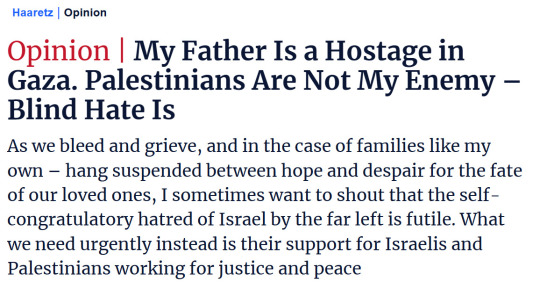
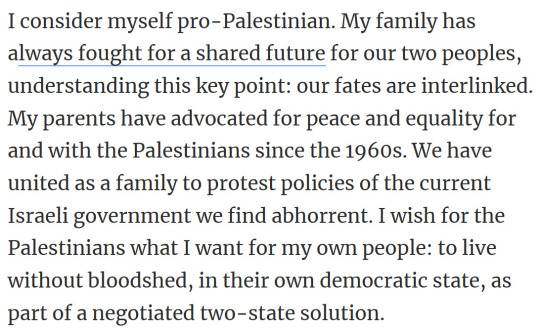
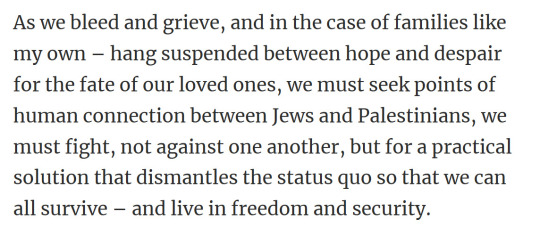
A highly recommended read. Full text of article under cut
On October 7, I was not hiding with my child in the safe room. My house was not burnt to the ground, and my husband didn't blow me a last kiss before his killer fired a fatal bullet.
I was safely at home in London where I have lived for over 30 years when my elderly peace-activist parents, Oded and Yocheved Lifschitz, along with 77 others members of the community, were taken hostage, barefoot and in their pajamas from their homes in the kibbutz where I was born and raised.
Israel's hostages in Gaza: A matter of life and death
Israeli peace activists who lost loved ones in the Hamas massacre stand their ground
What we can learn from released Hamas hostage Yocheved Lifshitz
For the past 229 days, together with the families of the other of hostages taken captive which now number 128, we have taken part in the fight for the lives of our loved ones.
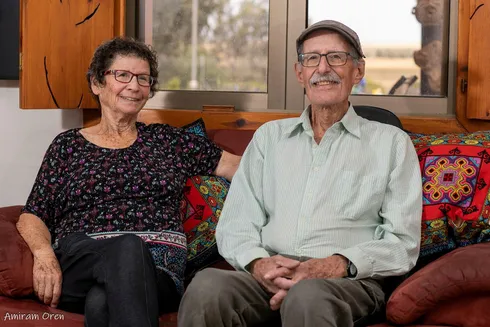
A photo of the writer, Sharone Lifschitz's parents, Yocheved and Oded Lifschitz, who were both kidnapped by Hamas to Gaza on October 7. To date, only Yocheved Lifschitz has returned. Credit: Amiram Oren
In Nir Oz, my family's kibbutz, one in four people (117 in total), were either executed or kidnapped. We are still piecing together the events of that brutal day that Hamas terrorists and some Gazan civilians, perpetrated medieval levels of cruelty, driven by hate and revenge, blinded by radical religious ideology and super-charged with amphetamines.
Last month, at the "Seder in the Streets" event in New York, activist Naomi Klein spoke as if none of that ever took place. Instead, addressing hundreds who gathered for a combination Passover Seder and protest of the war in Gaza, she spoke of what she termed the "False Idol of Zionism", comparing Jewish support of it to the Israelites "worshiping" the golden calf and recalling Moses' rage seeing the spectacle.
Klein's interpretation seems to miss the point: Moses, unlike Klein, did not disengage. He did not give up on his people when they worshipped a false idol. Instead, without compromising his integrity and beliefs, he guided them through the desert for forty more years in their journey to become a nation. Klein, at this dangerous moment in history, is failing to lead her listeners to take responsibility, to engage and work towards a shared future in the region for Jews and Palestinians, one built on the preciousness of life on both sides and an understanding of the original intention of Zionism: the necessity for a safe home for the Jewish people.
"Seder in the Street" was also protesting the heartbreaking and ongoing humanitarian crisis in Gaza and settler violence in the West Bank. Many in Israel, like my parents, would agree. Yet their plight and that of the other hostages – most of them civilians, from a baby boy of one year to a man of 86 - are not mentioned at Seder in the Streets or other gatherings of far-left pro-Palestinian Jewish activists.
My father, Oded Lifschitz, who is 83, and his friends who are also hostages, all in their late 70s and 80s, have worked for peace for decades. My mother, Yocheved Lifschitz, was thankfully released after 17 days of captivity.
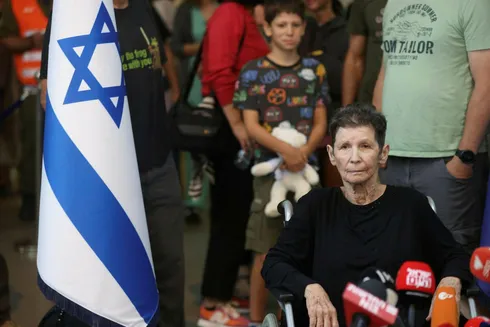
Yocheved Lifschitz after being released from 17 days in Hamas captivity, in Tel Aviv, Israel in late October. Credit: Tomer Appelbaum
How much more effective these protests could be if activists abroad could act as a bridge between the pro-Palestinian movement and progressives fighting for peace in Israel?
Hamas, a terrorist organization which has been systematically stripping freedom, women's rights and democracy from the Gaza strip since 2006 are also strangely left out of the discussion. In fact, I see more criticism of the Hamas attack and crimes from moderate Palestinian voices than from prominent Jewish voices of the pro-Palestinian movement in the United States and Europe.
Klein is instead content in disengaging from Israel based on a distorted idea of Zionism and in so doing offers no solidarity with the moderate, progressive Jews living in Israel and for whom rejecting Zionism is irrelevant at this moment. Whether we like our government's policies or hate them as many do, Israel is home. Just as Canada is Klein's home, whether or not she likes the policies of the Canadian government or condones its mistreatment of its Indigenous population.
I consider myself pro-Palestinian. My family has always fought for a shared future for our two peoples, understanding this key point: our fates are interlinked. My parents have advocated for peace and equality for and with the Palestinians since the 1960s. We have united as a family to protest policies of the current Israeli government we find abhorrent. I wish for the Palestinians what I want for my own people: to live without bloodshed, in their own democratic state, as part of a negotiated two-state solution.
The facts are indisputable to Zionists and non-Zionists alike: There are about 7 million Jews and 7 million Palestinians living in Israel and the occupied Palestinian territories of the West Bank and Gaza. Jewish Israelis cannot be expected to reject the idea that they can and should have the right to live safely in Israel. Without Israel, where would they go?
Everyone who cares about what's best for the region must strengthen those who are working for a peaceful future. As my father always says, "You make peace with your enemies."
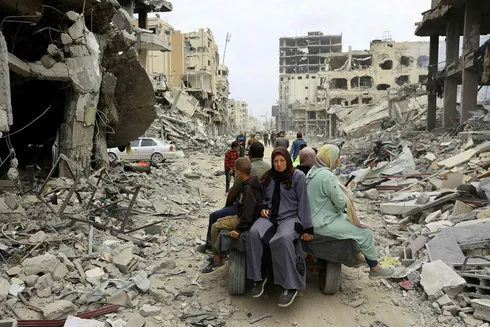
A Palestinian family rides on the back of a donkey-drawn carriage next to damaged buildings in Khan Yunis, in the southern Gaza Strip, in April.Credit: AFP
Thanks to international efforts to formulate a plan for the "day after" the war in Gaza, we are potentially closer to a long-term political agreement to lift us out of conflict than ever before. To help facilitate it, American and European progressives must distinguish between religious fanatics on both sides and those working toward a path of justice and peace for everyone in the region.
We must differentiate the liberal American pro-Palestinian activists from those who justify Hamas atrocities as acts of resistance. The dominant current narrative of the American far left, including the Jews among them, unwittingly aligns with Iran, and with antidemocratic and illiberal forces.
Instead of fostering hate and promoting disengagement from Israel, progressives abroad should help those in the region regain a sense that another future is possible and advocate for a negotiated political agreement that would create a state of Palestine established alongside the state of Israel. It won't be perfect, but it will be a good start.
The work of advocating for a different, sustainable future, must start with a call for the immediate release of hostages as part of a long-term agreement, backed by America and its allies, including moderate Arab states, that has the potential to transform the lives of Palestinians and Israelis by rescuing them from this ongoing tragedy. To fail to do so is to fail not just the hostages and their families, but to throw all the people of the region further into the abyss and undo the inspiring work of moderate forces within Israeli and Palestinian society.
In this, our darkest hour, we ask ourselves, who is our enemy? My enemy is the blind hate that seeks to erase the humanity of the other side. All of us who are horrified by what is unfolding in Gaza should work toward empowering the people of the region to move away from our common enemy. That's not Zionism, but rather the religious fanaticism we have within both our societies – Israeli and Palestinian – that threatens to engulf us all.
Sometimes, I want to shout at the news on TV, to remind people that their indulgent engagement in hatred of one side is so futile, so self-congratulatory. We can do better.
As we bleed and grieve, and in the case of families like my own – hang suspended between hope and despair for the fate of our loved ones, we must seek points of human connection between Jews and Palestinians, we must fight, not against one another, but for a practical solution that dismantles the status quo so that we can all survive – and live in freedom and security.
Sharone Lifschitz is a London-based filmmaker and academic originally from Kibbutz Nir Oz, whose parents were taken hostage on October 7. On Twitter: @Lifschitz_sha
#israel/palestine#Israel#palestine#hamas#israel hamas war#israel/hamas war#gaza#current events#october 7#hostages#hamas massacre#Simchat Torah massacre#10/7#I/p#hamas hostages#bring them home now#israeli hostages#israel gaza war#israel palestine war#israel palestine conflict#antisemitism#Jumblr#campus protests#pro palestine#Istg tagging this was so difficult there’s like 80 different names/notations used for this conflict
133 notes
·
View notes